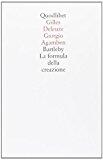
Bartleby: La formula della creazione
まだ評価がありません
Mystery
形式
ペーパーバック
ページ数
85
言語
イタリア語
公開されました
Jan 1, 1999
出版社
Quodlibet
ISBN-10
8886570252
ISBN-13
9788886570251
説明
In a narrative blending literary exploration with philosophical inquiry, R. Brigati invites readers on a thought-provoking journey through the life and mind of a complex character. Maries Gardella emerges as a figure grappling with the intricacies of creativity and existence, offering a unique perspective that oscillates between inspiration and existential reflection.
The atmosphere is rich with introspection as Gardella navigates a world filled with expectations, pressures, and the perpetual struggle for authenticity. Through vivid imagery and nuanced character development, the text delves into the themes of purpose and artistic expression, highlighting the challenges faced by those who dare to create in an often indifferent society.
Amidst the layers of Gardella's psyche, readers encounter a kaleidoscope of emotions that resonate with anyone who has pondered their place in the creative landscape. As the narrative unfolds, it resonates deeply with the universal longing for identity, connection, and meaning in the act of creation, making it a compelling read that lingers long after the final pages.
Brigati effectively weaves philosophical discourse into the narrative fabric, encouraging readers to reflect on their own beliefs about creativity and its implications. The book stands as a testament to the power of literature to provoke thought and inspire, inviting an exploration of what it truly means to create.
The atmosphere is rich with introspection as Gardella navigates a world filled with expectations, pressures, and the perpetual struggle for authenticity. Through vivid imagery and nuanced character development, the text delves into the themes of purpose and artistic expression, highlighting the challenges faced by those who dare to create in an often indifferent society.
Amidst the layers of Gardella's psyche, readers encounter a kaleidoscope of emotions that resonate with anyone who has pondered their place in the creative landscape. As the narrative unfolds, it resonates deeply with the universal longing for identity, connection, and meaning in the act of creation, making it a compelling read that lingers long after the final pages.
Brigati effectively weaves philosophical discourse into the narrative fabric, encouraging readers to reflect on their own beliefs about creativity and its implications. The book stands as a testament to the power of literature to provoke thought and inspire, inviting an exploration of what it truly means to create.